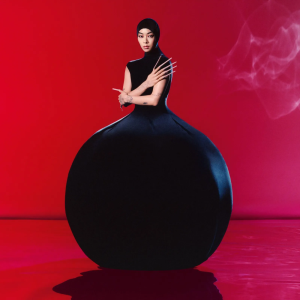Rina Sawayama navigates fury and forgiveness in “Hold the Girl”

courtesy of Dirty Hits Records
Rina Sawayama sings of hurt and healing in “Hold the Girl
October 9, 2022
Released on Sept. 16, Japanese-British singer Rina Sawayama’s second studio album, “Hold the Girl,” is a personal testimony of hurt, healing and her inner child. Written entirely during the pandemic, Sawayama draws from the pain of her past to fashion a vulnerable and resolute coming-of-age story.
Fans have been able to watch the themes of the album develop almost in real-time, with the rollout consisting of five pre-release singles that perfectly captured its essence. From the beginning, Sawayama’s intentions for “Hold the Girl” have been clear.
“‘Hold the Girl’ was the first song I wrote [for the album]. That came after a very intense therapy session I had that morning, and it was about how do you deal with a new perspective in trauma as an adult, basically; it’s about reparenting and holding your inner child,” Sawayama explained about the title track. In its chorus, she sings, “Reach inside and hold you close/ I won’t leave you on your own / Teach me the words I used to know / Yeah, I forgot them long ago,” which is just one of many verses following this theme of reconnecting with her younger self.
The complexity of Sawayama’s childhood is reflected in every aspect of her artistry. Sawayama shared a bedroom in London with her mother until she was fifteen, and found liberation through listening to pop music and live gigs before embarking on her own career. She bluntly acknowledges the suffocating, strained relationship she had with her mother while simultaneously expressing her gratitude for her mom’s sacrifice as a Japanese immigrant and single mother who worked multiple jobs to keep their family afloat. For example, the dichotomy of the lyrics “You put your wings on me” and “Made a prison of our home,” both from the album’s second single, “Catch Me in the Air,” captures the complexities of that relationship.
As a whole, Sawayama has never shied away from examining the difficult subjects within her music, including racism and xenophobia. After a string of independent releases, Sawayama made her studio album debut in 2020 with “Sawayama,” a maximalist, opulent, genre-defying commentary on pop and cultural expectations. For example, nu-metal track “STFU!” challenged the stereotypical expectation of Asian women to be submissive, while “Dynasty” discussed the inherited pain of family histories. Many children of immigrants to Western countries face contradictions of frustration, guilt, and pride toward their parents in cycles of generational trauma. in “Hold the Girl,” however, Sawayama takes full ownership of her individual story in the culmination of a years-long struggle for understanding.
To convey her message, Sawayama employs rock, Eurodance, and 2000s-inspired pop in a seamless fusing of genres that makes this album much more cohesive than her last. While slightly less eclectic than her debut album, “Hold the Girl” is bold nonetheless, showcasing Sawayama’s ability to confidently and consistently break the rules. The lead single, “This Hell,” sets the tone with retro country-pop that’s evocative of Shania Twain. Sawayama makes a party of tearing down homophobia, singing, “God hates us? Alright then / Buckle up, at dawn, we’re riding.”
Wild guitar riffs and pulsing, dance-floor-worthy instrumentals bring life to Sawayama’s emotional lyrics, and as discordant as that pairing sounds, she makes it work incredibly well. In “Holy (Til You Let Me Go),” she discusses the bigotry she faced at the University of Cambridge. The song starts off slow and almost bare, in accordance with the personal lyrics, and then suddenly erupts into a vibrant, disco-infused chorus.
“Holy (Til You Let Me Go)” and the four songs that follow it are a “winding journey through the dark times,” Sawayama said. They are some of the heaviest on the album, and simultaneously display Sawayama’s style in all its multifaceted glory. “Your Age” is full of unadulterated fury, glitchy with frustration in a way only pure anger can make you feel. “Imagining” follows it, employing another fast-paced and chaotic chorus. This, in combination with the screaming hyperpop and rock that floods the track, perfectly captures the confusion that comes with being a victim of gaslighting. “Frankenstein” is Sawayama at her very best, with a shifting, catchy tempo and a relentless energy. The lyrics are especially compelling as she uses the metaphor of being a monster to convey her desire to be “fixed” by someone else.
After this, the album winds down on a quieter note. “Send My Love to John” is a heartbreaking acoustic ballad, deviating from the previous tracks’ sounds, yet somehow falling into a perfect place within the album. Sawayama narrates the story of a mom who comes to accept her queer son after years of estrangement.
Finally, as the penultimate song of the album, “Phantom” serves as the perfect mirror to “Hold the Girl”. Here, her story of healing her inner child comes full-circle as she asks, “How do you hold a ghost?” The song builds to a heart-wrenchingly raw and emotional climax, and captures the very soul of the album.
In “Hold the Girl,” Sawayama analyzes all of her identities and strips down to the rawest version of herself. “I realized as an adult that I have spent my whole life pleasing other people and not realizing it— constantly pushing my boundaries and not realizing the difference between what I wanted to do and what other people wanted from me,” Sawayama said of the album. “I think when you spend your whole life trying to make other people happy, whether it’s your parents or school or this societal notion of what’s good … you genuinely forget what you want to do. What makes you happy? What are your values? I think this record overall is about finding out what those boundaries are.”
“Hold the Girl” is intimate but incredibly powerful, and significant in the way that Sawayama manages to express the emotions many people feel but often don’t believe they can talk about. Despite the heavy subject matter, none of the tracks sound truly sad. There is a sense of liberation and catharsis that comes with each and every track, with threads of renewal and pride woven throughout its very essence. In short, “Hold the Girl” is a triumph, and one that secures Sawayama’s spot as one of the most important artists of this generation.





